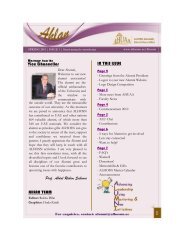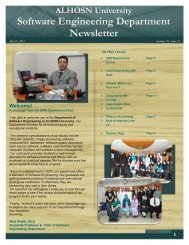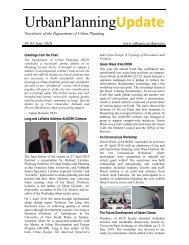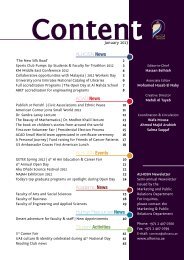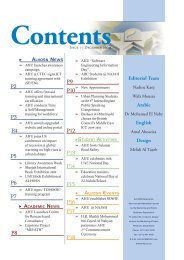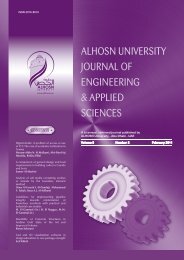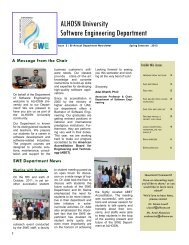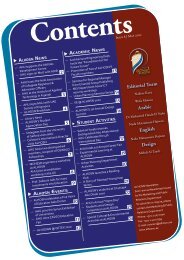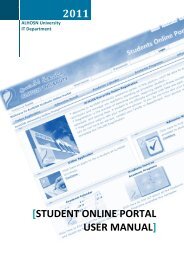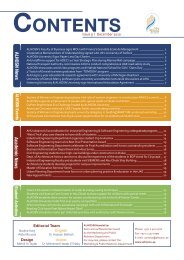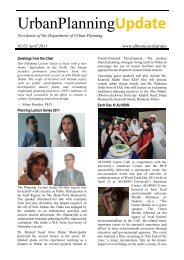ALHOSN University Catalogue Global Knowledge with Local Vision ...
ALHOSN University Catalogue Global Knowledge with Local Vision ...
ALHOSN University Catalogue Global Knowledge with Local Vision ...
You also want an ePaper? Increase the reach of your titles
YUMPU automatically turns print PDFs into web optimized ePapers that Google loves.
MGT 100 Introduction to Business (3 = 3 + 0)<br />
Prerequisite: None<br />
This course represents an early exposure to the concepts of business and management. It will focus mainly on<br />
topics like business trends, business ownerships and business management, among others. This enables the<br />
students to comprehend higher level business courses which will be offered in subsequent semesters.<br />
MGT 102 Management Communications (3 = 3 + 0)<br />
Prerequisite: FAS 101<br />
The objective of this course is to present a framework in which students can develop their written and oral<br />
communication skills. The course introduces communication theories and strategies for a variety of business<br />
situations including, letters, presentations, reports, and technology-based communications. The course examines<br />
methods for organizing ideas, analyzing data, addressing topics such as women in business and leadership,<br />
presenting information, and developing a professional communication style. Students are expected to gain an<br />
understanding of effective business communication through reading, writing, small group discussions, oral<br />
presentation, and other experiential learning opportunities. Class work emphasizes critical and strategic thinking,<br />
active learning, and teamwork. Methods of organizing information and developing a professional communication<br />
style will be covered.<br />
MGT 200 Principles of Management (3 = 3 + 0)<br />
Prerequisite: MGT 100<br />
This is an introductory course examining the role of the manager in modern business. It will focus on the theory<br />
and fundamental concepts of management including planning, organization, leadership, and control. This class will<br />
review the evolution of management thought, function and practice and will stress current approaches and<br />
emerging concepts.<br />
MGT 201 Organizational Behavior (3 = 3 + 0)<br />
Prerequisite: MGT 200<br />
This course provides a multi-disciplinary approach to the study of human behavior in organizations from the<br />
individual, group and organizational levels of explanation. Topics include personality and learning, workplace<br />
behaviors, motivation, teamwork, leadership, communication, decision making, conflict, and organizational change<br />
and structures.<br />
MGT 301 Business Law (3 = 3 + 0)<br />
Prerequisite: MGT 101<br />
An introduction to the field of business (commercial) law <strong>with</strong> emphasis on the law of torts, the law of contract, and<br />
the special contractual relationships involving commercial transactions, the employment relationship, business<br />
organizations, and property.<br />
MGT 303 International Business (3 = 3 + 0)<br />
Prerequisites: FAS 120, FIN 201, MKT 201<br />
This course is designed to give students a fundamental understanding of the environment in which international<br />
business operates and of the business practices required to compete successfully in global markets. This<br />
course shall provide an overview of the environment, concepts, and basic differences involved in international<br />
business. Topics include forms of foreign involvement, international trade theory, governmental influences on<br />
trade and strategies, international organizations, multinational corporations, personnel management, and<br />
international marketing. Upon completion, students should be able to describe the foundation of international<br />
business.<br />
MGT 304 Human Resource Management (3 = 3 + 0)<br />
Prerequisite: FAS 120, MGT 201<br />
This course provides an overview of the theory and practice of the human resources management (HRM)<br />
function in the organization. HRM is examined from the perspectives of various stakeholders, including<br />
management (supervisors and managers), employees, employers (the organization), as well as human resource<br />
practitioners and HR departments. The thematic focus is the structures and processes of effective human resources<br />
management <strong>with</strong>in the organization, including staffing, performance management, training and development,<br />
human resource planning and strategy, compensation and financial rewards. Consideration also is given to the<br />
various environments in which HRM occurs, addressing legal compliance issues, work place equality,<br />
occupational health, safety and wellness, and the evolving role of the HRM function.<br />
69



